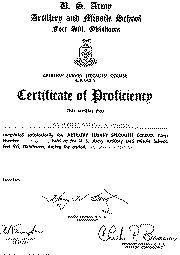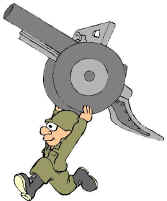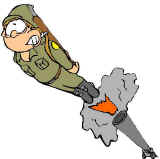Target Acquisition
|
Eleanor
Rigby
Died
in a church
And
was buried along with her name
Nobody came
Beatles |
Dominic
Vautier
8/11/2011
So what did I do in the army
besides drink beer and smoke and fraternize with the froileins?
Well, I was not a gun bunny or a cannon cocker for
sure. Instead I worked in a TAB unit, a
Target Acquisition Battalion.
A what?
It all started at Fort Sill
when I got to go to advanced survey school. Instead of being
immediately shipped out
overseas I was sent to this Advanced Artillery Survey Specialist School for an
additional five weeks specialized training. Only
some of us were selected to go, but
I'm not sure what criteria they used. It may have had something to do with background, or education
or attitude--well, probably not attitude. Anyway that's where I went.
 The
school involved a lot of advanced survey techniques;
triangulation, sun shots, star shots, and some experimental gyroscopic
equipment--which never did work. We
spend many hard hours in class crunching numbers,
applying formulas and solving advanced trigonometric functions, and of
course, working the ever tedious log and anti-log conversions. Military schools are not easy and they expect you to do all the
work and get all the assignments right and on time. The
instructors were top notch and know the subject material completely.
The
school involved a lot of advanced survey techniques;
triangulation, sun shots, star shots, and some experimental gyroscopic
equipment--which never did work. We
spend many hard hours in class crunching numbers,
applying formulas and solving advanced trigonometric functions, and of
course, working the ever tedious log and anti-log conversions. Military schools are not easy and they expect you to do all the
work and get all the assignments right and on time. The
instructors were top notch and know the subject material completely.
Most surprising of all, we were actually treated like human
beings for the first time. When we got up in
the morning there was no reveille—we just cleaned up, shaved, went to
breakfast, then to class. At
four in the afternoon we were dismissed, and got to do whatever
we wanted to do for the rest of the day; see a movie, go to the PX, visit Lawton, get a
hamburger at the snack bar, go to the library or the day room and shoot
pool and smoke, or just goof off. We couldn't
get drunk except on weekends because if you missed class you were washed
out.
What a
life indeed—no KP, no GI parties, no spit-shine boots, no polished brass,
no harassment, no footlocker inspections, no bad-ass sergeants breathing down our necks. All we had to do was study--that's it--pure heaven.
It seemed like we
had been taken out of those hot flames of purgatory and thrust directly into
heaven itself. Nobody was going to blow this sweet
gig.
I arrived in
Germany about the middle of April, 1965 and was
assigned to “A,2/25 Arty 7 Cor”, which is military parlance for A
Battery 2nd Battalion 25th Artillery Regiment,
attached to 7th Corps Artillery, which is the Army’s
own unique nomenclature. It was all part of
UASREUR (pronounced use-a-rar) standing for U. S. Army Europe. My unit was a target acquisition outfit, or FATAB (Field
Artillery Target Acquisition Battalion). Our mission was simple—go find targets
quickly when they fire, and tell the big guns
where they were and how to bring return fire.
We had 2
commissioned target ACQ outfits in Germany, and another in Vietnam,
but the role of target acq was far more difficult in Vietnam where no set lines of
battle existed, and the enemy kept in constant
motion. FOs (forward observers) was
particularly dangerous.
"In country" the life expectancy of an FO or surveyor was about four
days, so you didn’t want to go to Nam. Unfortunately I know a
few guys who wanted "to see some action", and volunteered to go. Sadly to say, these
statistics proved correct.
A typical TAB battery consisted of around 110 men, divided into six platoons,
three operational platoons and three support platoons. Each platoon had a specific assignment:
 Flash
was probably the worst
possible place to be during an actual wartime engagement. Those poor guys had to go out with their scopes and establish FO
(forward observer) positions well ahead of a main military force. We in survey carried “control” to the FO positions, so they
would know where they were and then could “bring fire” on enemy
positions. During maneuvers and actual war games we were always loosing
flash guys. They had a way
of getting missed or left behind because frequently their positions had to
change. Being an FO did not
require a lot of intelligence in the first place, and it seams that
anybody who wanted to be an FO didn't have very much to begin
with. Sometimes these guys
would get lost, go the wrong way, or get
captured by the “enemy”. Being in flash, to put it mildly,
was not a great sign of distinction.
Flash
was probably the worst
possible place to be during an actual wartime engagement. Those poor guys had to go out with their scopes and establish FO
(forward observer) positions well ahead of a main military force. We in survey carried “control” to the FO positions, so they
would know where they were and then could “bring fire” on enemy
positions. During maneuvers and actual war games we were always loosing
flash guys. They had a way
of getting missed or left behind because frequently their positions had to
change. Being an FO did not
require a lot of intelligence in the first place, and it seams that
anybody who wanted to be an FO didn't have very much to begin
with. Sometimes these guys
would get lost, go the wrong way, or get
captured by the “enemy”. Being in flash, to put it mildly,
was not a great sign of distinction.
I seems flash collected the
flotsam and jetsam of life, the dropouts, the malcontents, the groaners and
moaners of the world. It’s
safe to say that they were a fast-moving, heavy drinking, and spirited
bunch, because they knew that if war ever did break out, they would be
the first exposed, and probably the first to go. If an FO got sent to
Vietnam, it was equivalent to death sentence.
 Sound
were usually smart guys, engineers and
electronic dudes mostly. They
were quiet and kept to themselves a lot, but I did know a few people from
sound. Their mission was to
set up mike bases, a series of sensitive microphones
placed at specific locations more or less in a line. A
mike base usually consisted of six microphones, 100 meters, 200 meters,
or 400 meters apart. A 200
meter mike base was the ideal and easy to survey in.
400 meter mike bases were really really big--2400 meters long.
they were a bear to survey in.
Sound
were usually smart guys, engineers and
electronic dudes mostly. They
were quiet and kept to themselves a lot, but I did know a few people from
sound. Their mission was to
set up mike bases, a series of sensitive microphones
placed at specific locations more or less in a line. A
mike base usually consisted of six microphones, 100 meters, 200 meters,
or 400 meters apart. A 200
meter mike base was the ideal and easy to survey in.
400 meter mike bases were really really big--2400 meters long.
they were a bear to survey in.
The mikes recorded sound activity.
They were able to factor in temperature, air pressure, and wind
direction, and pinpoint enemy positions quickly. Surveys job was to established “control” for the mike base.
Radar
- We had two radars in our
battery. It seems that they
were always breaking down, or getting stuck in the mud somewhere. Ideally the radars were positioned on either side of a mike base,
and these things could track trajectories of “incoming” and quickly
calculate the origin.
By the use of
sound, flash, and radar, enemy targets could be very accurately
acquired, that is, if everything worked right, which seemed never to
happened. never
did.
We also had three
support platoons in the battery:
 Headquarters
consisted of cooks, clerks, bookkeepers, motor pool mechanics, and anybody
who had nothing to do in particular, or who washed out at
anything else. I got to work in the motor pool for awhile.
It was something to do, and kind of fun, but I never seriously
considered transferring to HQ.
Headquarters
consisted of cooks, clerks, bookkeepers, motor pool mechanics, and anybody
who had nothing to do in particular, or who washed out at
anything else. I got to work in the motor pool for awhile.
It was something to do, and kind of fun, but I never seriously
considered transferring to HQ.
Commo
was, as near as I could tell, a bunch of clowns who ran around stringing
wire everywhere. Seems like that's all they ever did was string wire. But I do have some other stories about these guys.
Survey
was the
glue that held all this stuff together, the framework that made the whole unit work.
Without survey nothing could or would function.
The survey platoon
consisted of 4 survey parties (or teams) of 6 to 8
men each, but we
never had the equipment or manpower to run more than 3 teams
at one time. The 4th party was used as a
spare,
so if any equipment broke down, it would be automatically reassigned to
4th party. It was also a place where we put the non-performers and goof-offs. It became the garbage collector party of the platoon.
One time we
actually tried to run 4 parties. It was a disaster.
I don't know exactly how much of the
25th artillery regiment was active when I served, but I think a lot if it had
been decommissioned after WW2. Our battalion had two active batteries that
I was aware of, A
Battery stationed in Bamberg and C Battery in Sweinfurt,
Germany.
The entire concept of target ACQ has
changed considerably with GPS and newer electronic surveillance. Targets
are immediately electronically acquired in today's army.
 Flash
was probably the worst
possible place to be during an actual wartime engagement. Those poor guys had to go out with their scopes and establish FO
(forward observer) positions well ahead of a main military force. We in survey carried “control” to the FO positions, so they
would know where they were and then could “bring fire” on enemy
positions. During maneuvers and actual war games we were always loosing
flash guys. They had a way
of getting missed or left behind because frequently their positions had to
change. Being an FO did not
require a lot of intelligence in the first place, and it seams that
anybody who wanted to be an FO didn't have very much to begin
with. Sometimes these guys
would get lost, go the wrong way, or get
captured by the “enemy”. Being in flash, to put it mildly,
was not a great sign of distinction.
Flash
was probably the worst
possible place to be during an actual wartime engagement. Those poor guys had to go out with their scopes and establish FO
(forward observer) positions well ahead of a main military force. We in survey carried “control” to the FO positions, so they
would know where they were and then could “bring fire” on enemy
positions. During maneuvers and actual war games we were always loosing
flash guys. They had a way
of getting missed or left behind because frequently their positions had to
change. Being an FO did not
require a lot of intelligence in the first place, and it seams that
anybody who wanted to be an FO didn't have very much to begin
with. Sometimes these guys
would get lost, go the wrong way, or get
captured by the “enemy”. Being in flash, to put it mildly,
was not a great sign of distinction. The
school involved a lot of advanced survey techniques;
triangulation, sun shots, star shots, and some experimental gyroscopic
equipment--which never did work. We
spend many hard hours in class crunching numbers,
applying formulas and solving advanced trigonometric functions, and of
course, working the ever tedious log and anti-log conversions. Military schools are not easy and they expect you to do all the
work and get all the assignments right and on time. The
instructors were top notch and know the subject material completely.
The
school involved a lot of advanced survey techniques;
triangulation, sun shots, star shots, and some experimental gyroscopic
equipment--which never did work. We
spend many hard hours in class crunching numbers,
applying formulas and solving advanced trigonometric functions, and of
course, working the ever tedious log and anti-log conversions. Military schools are not easy and they expect you to do all the
work and get all the assignments right and on time. The
instructors were top notch and know the subject material completely.
 Sound
were usually smart guys, engineers and
electronic dudes mostly. They
were quiet and kept to themselves a lot, but I did know a few people from
sound. Their mission was to
set up mike bases, a series of sensitive microphones
placed at specific locations more or less in a line. A
mike base usually consisted of six microphones, 100 meters, 200 meters,
or 400 meters apart. A 200
meter mike base was the ideal and easy to survey in.
400 meter mike bases were really really big--2400 meters long.
they were a bear to survey in.
Sound
were usually smart guys, engineers and
electronic dudes mostly. They
were quiet and kept to themselves a lot, but I did know a few people from
sound. Their mission was to
set up mike bases, a series of sensitive microphones
placed at specific locations more or less in a line. A
mike base usually consisted of six microphones, 100 meters, 200 meters,
or 400 meters apart. A 200
meter mike base was the ideal and easy to survey in.
400 meter mike bases were really really big--2400 meters long.
they were a bear to survey in. Headquarters
consisted of cooks, clerks, bookkeepers, motor pool mechanics, and anybody
who had nothing to do in particular, or who washed out at
anything else. I got to work in the motor pool for awhile.
It was something to do, and kind of fun, but I never seriously
considered transferring to HQ.
Headquarters
consisted of cooks, clerks, bookkeepers, motor pool mechanics, and anybody
who had nothing to do in particular, or who washed out at
anything else. I got to work in the motor pool for awhile.
It was something to do, and kind of fun, but I never seriously
considered transferring to HQ.